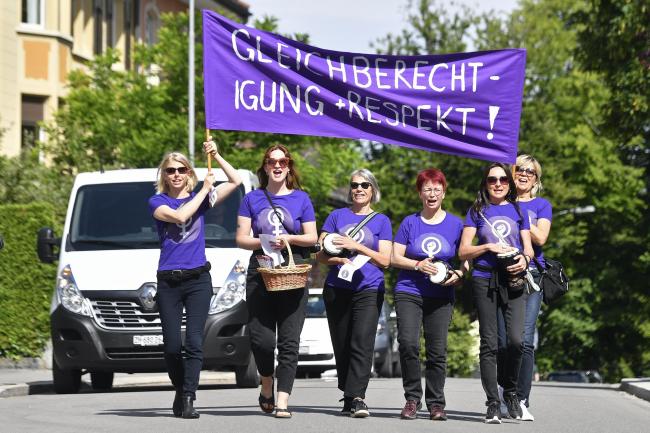World Economic Forum
Women in Switzerland Stage Strike for Equality

Source:Walter Bieri/Keystone/The Associated Press
After 500,000 people took to the streets on June 14, 1991, the government responded with a federal law on equality. 28 years later, Swiss women were back on the streets on June 14 in a nationwide women's strike to protest at a lack of progress on gender equality and fair pay.
Views
Women in Switzerland Stage Strike for Equality
By Charlotte Edmondweb only
It's one of the wealthiest and democratic countries in the world, but as recently as 1991, some women in Switzerland were still denied the right to vote. As women marched for their rights, the Federal Supreme Court forced the one remaining canton where only men could vote to change its ways.
But, a generation on, Swiss women were back on the streets on June 14 in a nationwide women's strike to protest at a lack of progress on gender equality and fair pay.
As well as demanding equal pay for equal work, they are calling for the recognition of ‘women’s work’ and policies to end violence and discrimination against women.

Switzerland is a major financial centre and home to several multinational corporations. It has one of the lowest unemployment rates in Europe, with maternal employment particularly high. But despite this, its traditional outlook on family issues means it has been slow at adopting policies that support women.
“There is a whole range of issues on which we still need to progress, be they classic themes like equal pay or new themes that a new generation of young women have raised such as harassment in the street," Green Party politician, Adele Thorens told Reuters.
“As a politician, I would like to highlight a key theme that corresponds to what I have experienced, which is under-representation of women in organs of power, at the political level, but also at the economic level, and in all spheres of our society where important decisions are taken.”
The Right to Vote
In February 1971, Swiss men voted to allow women to take part in federal elections - already decades later than many of its European neighbours and almost 80 years after New Zealand.
But it took a further two decades before all the cantons - the semi-autonomous regions that operate a bit like US states - followed suit. By contrast, at the time of the federal court ruling in 1991, Britain's first female prime minister, Margaret Thatcher, had already ended her decade in office.
Have you read?
♦ Asia’s 10 Most Gender Equal Countries
♦ Empowering Female Entrepreneurs in Taiwan
♦ The Heroine of Taiwan’s Aviation Industry
The Gender Gap
As progress on gender equality stagnated globally, the World Economic Forum’s 2018 Gender Gap Report placed Switzerland 20th among 149 nations.
It scored well with regard to political empowerment, with 35 women in parliament and 27 in ministerial positions. Ruth Dreifuss became the first female president of Switzerland in 1999 and there have been others since.
But when it comes to economic participation, it was in 34th place, down from 18th in 2006. Only 34% of legislators, senior officials and managers are female, compared with 66% male.
Working Mums
Figures from the Federal Bureau of Statistics show a gender pay gap of nearly 20%.
The headline employment rate masks the particularly high number of women in part-time work and the OECD has called on Switzerland to address some of its policies to support working mothers
At the time of that report, in 2004, 75% of Swiss mothers worked part-time out of necessity to cover childcare, which the OECD said would hinder their career progression.
 Image: Federal Statistical Office
Image: Federal Statistical Office
Not So Family-Friendly
A Unicef report released this month portrays Switzerland as the least family-friendly country in Europe, with other poor performers including Greece, Cyprus, the UK and Ireland.
The report outlines policies that make life hard for families in Switzerland: it offers the shortest paid maternity leave in Europe and one of the lowest in the OECD. It is also one of only a handful of countries to offer no paid leave for fathers.
Paid maternity leave was only introduced in Switzerland in 2005 after a bumpy ride which saw it fail four times at the ballot box.
 Image: Unicef
Image: Unicef
Less obvious drivers keeping women out of work include irregular school hours: many schools in Switzerland close on Wednesdays and for lunch, making full-time roles difficult.
Childcare costs in Switzerland can also be prohibitive. A 2011 OECD report found that it doesn’t pay to work.
Swiss families spend more of their income than any other in the world on childcare, and finding a childcare place may also be tricky.
After the original women's strike, on June 14, 1991, when 500,000 people took to the streets, the government responded with a federal law on equality, establishing the right to maternity leave and protection against domestic violence. Today's strikers are hoping their demands are met for good this time.
Original content can be found at the website of World Economic Forum: Women in Switzerland have gone on strike - this is why
This article is reproduced under the permission of World Economic Forum (WEF) and terms of Creative Commons Attribution-NonCommercial-NoDerivs 4.0 Unported License (“CCPL”). It presents the opinion or perspective of the original author / organization, which does not represent the standpoint of CommonWealth magazine.










